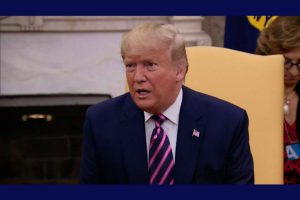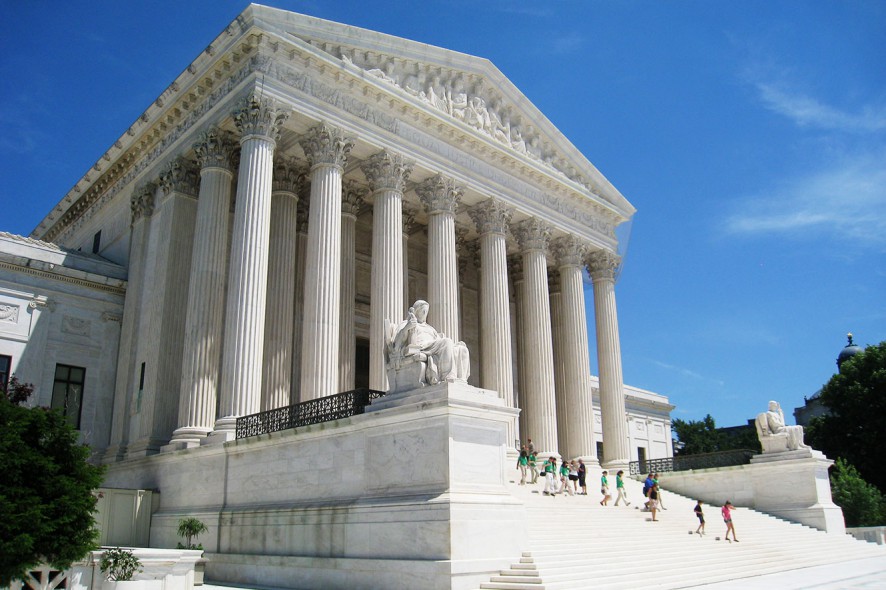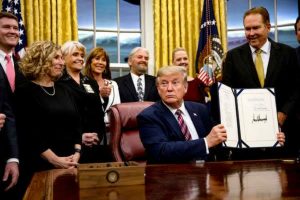US SC: In a high-profile set of rulings, the US Supreme Court has, in a 7:2 verdict, held that the t President Trump is not immune from criminal investigation and he must release his financial records so that they can be examined by prosecutors in New York. He, however, does not have to share this information with Congress.
Background of the case
The cases relate issuance of subpoena to produce financial records relating to President Trump and business organizations affiliated with him, including tax returns and related schedules, from 2011 to the present. President Trump, however, argued that under Article II and the Supremacy Clause, a sitting President enjoys absolute immunity from state criminal process. He asked the court to issue a declaratory judgment that the subpoena is invalid and unenforceable while the President is in office and to permanently enjoin the district attorney from taking any action to enforce the subpoena.
Majority Opinion on New York prosecutors’ demand for President Trump’s documents
“Two hundred years ago, a great jurist of our Court established that no citizen, not even the President, is categorically above the common duty to produce evidence when called upon in a criminal proceeding. We reaffirm that principle today and hold that the President is neither absolutely immune from state criminal subpoenas seeking his private papers nor entitled to a heightened standard of need.”
Refusing to conclude that absolute immunity is necessary or appropriate under Article II or the Supremacy Clause, the majority opinion stated that such a heightened standard would extend protection designed for official documents to the President’s private papers. The President retains the right to assert privilege over documents that, while ostensibly private, “partake of the character of an official paper.”
The majority was also of the opinion that in the absence of a need to protect the Executive, the public interest in fair and effective law enforcement cuts in favor of comprehensive access to evidence. Requiring a state grand jury to meet a heightened standard of need would hobble the grand jury’s ability to acquire “all information that might possibly bear on its investigation.
It further stated that even assuming the evidence withheld under that standard were preserved until the conclusion of a President’s term, in the interim the State would be deprived of investigative leads that the evidence might yield, allowing memories to fade and documents to disappear. This could frustrate the identification, investigation, and indictment of third parties (for whom applicable statutes of limitations might lapse). More troubling, it could prejudice the innocent by depriving the grand jury of exculpatory evidence.
The Court, however, clarified that rejecting a heightened need standard will not leave Presidents with “no real protection.”
Following remedies will be available to the President:
- the right to challenge the subpoena on any grounds permitted by state law, which usually include bad faith and undue burden or breadth
- President can raise subpoena-specific constitutional challenges, in either a state or federal forum. He can challenge the subpoena as an attempt to influence the performance of his official duties, in violation of the Supremacy Clause
- the Executive can—as the district attorney concedes—argue that compliance with a particular subpoena would impede his constitutional duties.
Majority Opinion on congressional demands for President Trump’s documents
“Congressional demands for the President’s information present an interbranch conflict no matter where the information is held—it is, after all, the President’s information.”
The majority opinion of the Court stated that the interbranch conflict here does not vanish simply because the subpoenas seek personal papers or because the President sued in his personal capacity. The President is the only person who alone composes a branch of government. As a result, there is not always a clear line between his personal and official affairs. “The interest of the man” is often “connected with the constitutional rights of the place.”
The Court further stated that
“a subpoena for personal papers may pose a heightened risk of such impermissible purposes, precisely because of the documents’ personal nature and their less evident connection to a legislative task.”
T he majority was, hence, of the opinion that in assessing whether a subpoena directed at the President’s personal information is “related to, and in furtherance of, a legitimate task of the Congress,” courts must perform a careful analysis that takes adequate account of the separation of powers principles at stake, including both the significant legislative interests of Congress and the “unique position” of the President.
he majority was, hence, of the opinion that in assessing whether a subpoena directed at the President’s personal information is “related to, and in furtherance of, a legitimate task of the Congress,” courts must perform a careful analysis that takes adequate account of the separation of powers principles at stake, including both the significant legislative interests of Congress and the “unique position” of the President.
The Court took note of the following considerations to reach to the aforementioned conclusion:
- The President’s unique constitutional position means that Congress may not look to him as a “case study” for general legislation.
- Unlike in criminal proceedings, where the very integrity of the judicial system would be undermined without full disclosure of all the facts , efforts to craft legislation involve predictive policy judgments that are not hampered in quite the same way when every scrap of potentially relevant evidence is not available.
- To narrow the scope of possible conflict between the branches, courts should insist on a subpoena no broader than reasonably necessary to support Congress’s legislative objective. The specificity of the subpoena’s request “serves as an important safeguard against unnecessary intrusion into the operation of the Office of the President.”
- Courts should be attentive to the nature of the evidence offered by Congress to establish that a subpoena advances a valid legislative purpose. It is “impossible” to conclude that a subpoena is designed to advance a valid legislative purpose unless Congress adequately identifies its aims and explains why the President’s information will advance its consideration of the possible legislation.
- Burdens imposed by a congressional subpoena should be carefully scrutinized, for they stem from a rival political branch that has an ongoing relationship with the President and incentives to use subpoenas for institutional advantage.
[Trump v. Vance, No. 19–635 and Trump v. Mazars USA LLP, No. 19–715, 2020 SCC OnLine US SC 3, decided on 09.07.2020]








